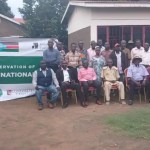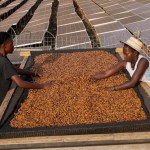(JUBA) – A growing number of women in South Sudan are moving from aid dependency to small scale entrepreneurship, following an International Trade Centre initiative that has trained nearly two hundred survivors of conflict related violence in farming, soap making and retail business management.
The programme launched in October 2024 by the International Trade Centre in partnership with local organisations in Juba, Bentiu, Yambio and Bor provided both business skills and start up grants. For many women who had relied on irregular food rations or informal roadside sales, the shift to structured trade has proven to be financially transformative.
Among them is Stella Kakayo, a single mother of three in Juba. She had previously survived by selling food items door to door. When sales stalled, she would cook unsold goods for her children. Eventually, there was nothing left to sell or eat.
After joining the training scheme, she used her grant to purchase African bags, dresses and craft shoes, while also making liquid soap and a local hair product. Her monthly profit now reaches about 180,450 South Sudan Pounds, equivalent to 25 US dollars based on current exchange rates of 7,100 SSP to one dollar.
The impact of income stability was immediate. Stella has returned her children to school and can now cover daily household costs.
In Yambio, farmer and mother of nine, Veronica Gabriel, faced the daily task of choosing between food and school supplies. Nights without meals were common. Today, she cultivates groundnuts and maize, selling part of the harvest while keeping enough for family meals. She now pays school fees without borrowing.
Other participants report similar experiences. Physically disabled mother of five, Santina Sebit Alfred, now bakes bread, makes samosas, produces both liquid and solid soap, plaits hair and knits bedsheets. Former firewood collector Tereza Yohanis now buys basic food products in Konyokonyo market and sells them inside her camp.
Rather than receiving food rations, participants were given business tools and training. As Tereza explained, “They taught us how to start and run our own businesses. Now I sell groundnuts, crackers and mandazi.”
The model shows growing relevance as international humanitarian aid budgets shrink. Instead of temporary relief, small capital injections linked with training have delivered practical income sources, reducing pressure on households and improving local market supply.
The programme is part of a wider initiative titled “Building socio economic resilience for survivors of Conflict Related Sexual Violence in South Sudan”. It was implemented with support from the United Nations Mission in South Sudan and the United Nations Population Fund.
While the current number of beneficiaries is small relative to national need, business analysts in Juba say the model could be adapted for wider use, particularly among returnees and widows in counties where formal employment is scarce. Scaling up such interventions could also build stronger rural supply chains and reduce dependence on imports from neighbouring countries.
For many participants, the greatest change was not only financial. As one beneficiary, Mariam Jaffar, put it, “Before, I wondered why I was still alive. Now people ask me to train them.”
Women’s Trade Support in South Sudan
| Participant Location | Previous Livelihood | Current Income Activity | Estimated Monthly Profit (SSP / USD) | Main Household Benefit |
|---|---|---|---|---|
| Juba (Stella Kakayo) | Informal food vending with frequent losses | Sale of handicrafts, liquid soap and hair products | 180,450 SSP / $25.41 | Children back in school, steady food supply |
| Yambio (Veronica Gabriel) | Dependent on inconsistent farming | Groundnut and maize farming for sale and consumption | Not disclosed (estimated small surplus income) | Able to pay school fees and buy soap and salt |
| Bentiu / Juba (Mariam Jaffar) | Unable to afford medical care | Soap making and training others | Not disclosed | Regained dignity and confidence |
| Yambio (Santina Sebit Alfred) | No stable income – disability barrier | Bread, samosas, soap production, hair plaiting and knitting | Not disclosed | Supports five children independently |
| Camp Market Seller (Tereza Yohanis) | Firewood collection | Sales of groundnuts, crackers and mandazi | Not disclosed | Replaced aid dependency with regular trade |


















































